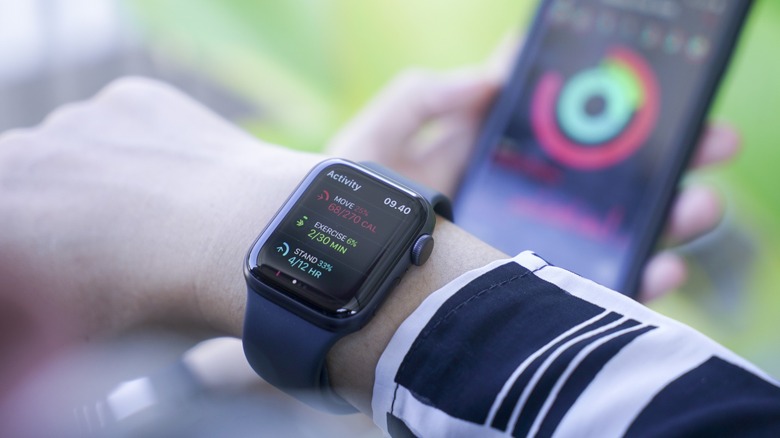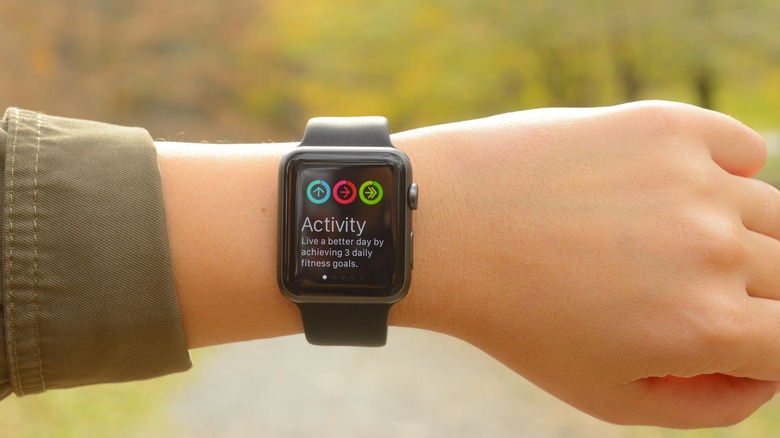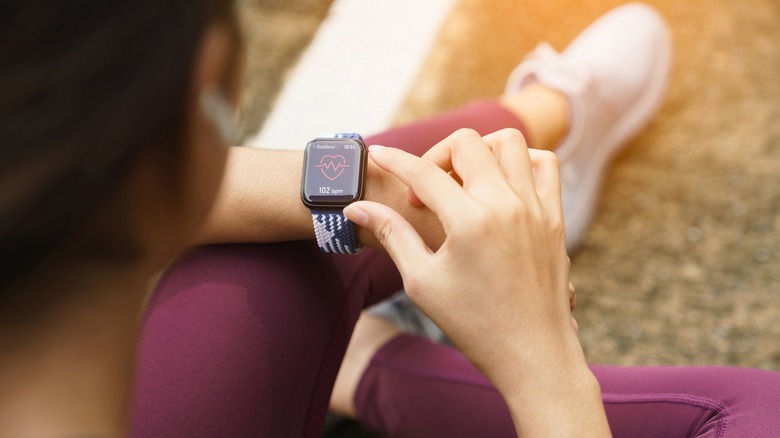How Accurate Is The Apple Watch's Heart Rate Monitor?
The pursuit of a healthy lifestyle is ongoing, which is why companies like Apple took the initiative to provide tools designed to be part of a solution. Apple's signature wearable, the Apple Watch, has been providing health monitoring options since its first iteration in 2015, offering users the chance to keep up with their vitals in real time.
With the Apple Watch, users no longer had to wait until a doctor's visit or awkwardly sit at a public machine in their local grocer to see their heart rate. With a few quick taps, it would be displayed right on their wrist. Of course, with the first wearables, the efficacy of the built-in sensors came into question, especially since the Apple Watch wasn't necessarily a fitness device.
While studies found that the original Apple Watch achieved a 99.9% accuracy in tests against a professional clinical pulse oximeter, there have been nine new Apple Watch releases since. Consistency in results across generations is never a guarantee, as a 2017 study found when heart rate accuracy was tested once again only to find a slight near 2% dip in the original 99.9% accuracy.
Though logic would suggest that the newest Apple Watch would provide the most accurate results, it's better to do a deep dive into real results to ensure you're trusting the right devices with your health.
How Does the Apple Watch Detect Heart Rate?
There are currently three Apple Watch models on the market—the Apple Watch SE, Apple Watch Series 9, and Apple Watch Ultra 2. Each model uses the same optical sensor that physically detects the flow of blood using photoplethysmography.
To obtain a reading while the wearer is active, the watch shoots a green LED into their skin at a rate of hundreds of pulses per second, which the blood absorbs. Using this absorption rate, the watch's sensors can determine fluctuations in blood flow to calculate the heart rate every five seconds. If the user isn't actively using the heart rate sensor, the Apple Watch is still recording, but it uses infrared light instead.
Starting from Apple Watch Series 4 and all Ultra models, Apple integrated electrodes in the device's backing and Digital Crown. These can provide a faster and more accurate reading but require you to keep a finger on the Digital Crown. Measurements are taken every second and displayed via the Heart Rate app.
How Accurate Are the Apple Watch Sensors?
A study published in December 2023 in the National Library of Medicine sought to record the updated heart rate accuracy results on a more modern Apple Watch's 1 lead electrocardiogram (ECG) to determine its overall accuracy.
From May to October 2021, "The Reliability of the Apple Watch's Electrocardiogram" compared the Apple Watch I lead ECG to a standard 12-lead ECG, which uses 12 nodes to report accurate data.
After running 469 different comparisons between the professional ECG machine and the Apple Watch ECG sensor, it was determined that the wearable was comparable to the 12-lead ECG. Using just one point of contact, the Apple Watch was able to interpret cardiovascular disorders like atrioventricular blocks and atrial fibrillation. Because of this, the researchers determined that the Apple Watch ECG was a suitable means of monitoring daily heart activity, including one's heart rate.
These results align with the earlier study on the original Apple Watch mode, suggesting that, while the wearable has improved in many ways, there's been little need for adjustment in the heart rate sensor.
Is the Apple Watch the Most Accurate Heart Rate Sensor?
There are a number of devices on the market that can measure the user's heart rate. One of the most notable brands in fitness tracking is Fitbit. Users looking for the most accurate heart rate sensor for a wrist-based wearable may gravitate toward Fitbit, not just because of its dedication to personal health, but also its price. However, a 2018 study presented by the Heart Rhythm Society noted findings that suggested quite the opposite.
The study compared results from the Apple Watch Series 2, Samsung Galaxy Gear S3, and the Fitbit Charge 2 across 51 patients with histories of paroxysmal supraventricular tachycardia (PSVT), or abnormal heart rhythms. Patients were randomly assigned two of the three devices, which they wore on each wrist, and readings were recorded at a baseline and during elevated PSVT episodes.
After the study, researchers found that both the Apple Watch Series 2 and Samsung Galaxy Gear S3 achieved a 100% accurate heart rate within 10 bpm. The Fitbit, on the other hand, achieved only 88%.



